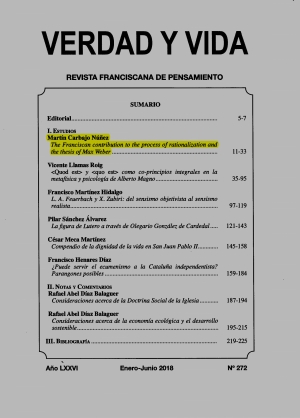 Carbajo N˙˝ez MartÝn ,
The Franciscan contribution to the process of rationalization and the thesis of Max Weber,
in
Verdad y Vida, 272 (2018) p. 11-33
.
Carbajo N˙˝ez MartÝn ,
The Franciscan contribution to the process of rationalization and the thesis of Max Weber,
in
Verdad y Vida, 272 (2018) p. 11-33
.
Summary: This article analyzes the Franciscan contribution to the process of rationalization. Max Weber affirms that this process is a key factor of Modernity and a salient feature of modern economics. The rational way of facing practical problems, especially in the field of economics, would have favored the consolidation of the spirit of Capitalism. According to Weber, the 16th century Protestant Reformation, especially Calvinism, had a decisive role in this, something that has never been observed among Catholics. However, this article presents important Franciscan contributions in the previous centuries, thus contradicting Weber’s affirmations. At the same time, this contribution shows the importance of the Franciscan intellectual tradition in the formation of Modern culture.
Key words: Franciscanism, science, rationalization, Modernity, Max Weber
Sommario: Questo articolo analizza il contributo dei Francescani al processo di razionalizzazione. Questo processo, secondo Max Weber, sarebbe la chiave della modernità e dell'economia attuale. Il modo razionale di affrontare i problemi pratici nel campo economico avrebbe favorito il consolidamento del “spirito del capitalismo” e, in questo, Weber attribuisce un ruolo decisivo alla Riforma protestante del XVI secolo, principalmente al calvinismo, e sostiene che questo tipo di razionalizzazione mai si era visto tra i cattolici. Il notevole contributo dei Francescani, iniziato nei secoli precedenti, contraddice queste affermazioni e mostra l'importanza della tradizione intellettuale francescana nella formazione della cultura moderna.
Parole chiave: Francescanesimo, scienza, razionalizzazione, Modernità, Max Weber
Resumen: Este artículo analiza el aporte de los franciscanos al proceso de racionalización que, según Max Weber, es la clave de la Modernidad y de la actual economía. Ese modo racional de afrontar los problemas prácticos en el campo económico habría favorecido la consolidación del “espíritu del capitalismo” y, en esto, Weber atribuye un papel decisivo a la Reforma protestante del siglo XVI, sobre todo en su variante calvinista, algo que “ni se daba ni se da entre los católicos”. El notable aporte de los franciscanos durante los siglos XIII-XV contradice estas afirmaciones, a la vez que muestra la importancia de la tradición franciscana en la formación de la cultura moderna.
Palabras clave: Franciscanismo, ciencia, racionalización, modernidad, Max Weber
Indice:
1. The process of rationalization
1.1. Max weber’s thesis
1.2. Separation between “heavenly” and “earthly” realms
1.3. From the vision of faith to consumerism
1.4. The debate on weber’s thesis
1.5. Material progress, competitiveness, and secularization
2. The Franciscan contribution to the process of rationalization
2.1. A holistic science, always linked to theology and morality
2.2. Contribution to modern economy
2.2.1. Mounts of piety, microcredit and civil economy
2.2.2. Double entry accounting
2.3. The beginnings of modern experimental science
2.4. Bases of modern epistemology
2.5. Subjective rights and constitutionalism
2.6. Political management of the market on rational basis
2.7. Setting the method of modern ethnographic studies
Conclusion
Key words: Max Weber, Rationalization, Franciscanism, Economics, Protestantism
(Attached file) |
